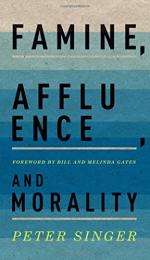|
This section contains 302 words (approx. 1 page at 400 words per page) |

|
Born in 1946, Peter Singer is an Australian philosopher and professor known for his contributions to moral philosophy, particularly in the field of applied ethics. He is currently a professor of moral philosophy at Princeton University. While "Famine, Affluence, and Morality" is a call to alleviate human suffering, he is known, especially outside of philosophy circles, for his contributions to the animal rights movement.
Singer is also known for his utilitarianism, the ethical theory that considers the moral action to be the one that maximizes "utility," a term that originates from philosophers Jeremy Bentham and John Stuart Mill and means happiness, or general well-being. Though there are many versions of utilitarianism, the one that Singer's philosophy resembles the most is "preference utilitarianism," which holds that we should seek to maximize people's interests, or preferences, rather than some calculated version of happiness. Singer's ethics may also be seen...
|
This section contains 302 words (approx. 1 page at 400 words per page) |

|




